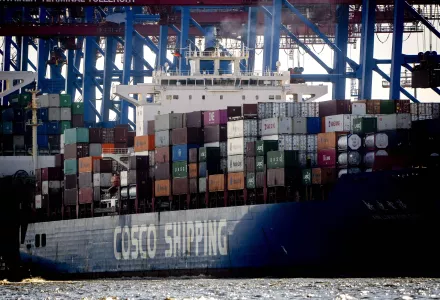
China’s Belt and Road Initiative (BRI) has for years held a prominent position in the global infrastructure investment space. In the absence of similarly far-reaching projects coordinated by other countries including the transatlantic partners, important questions about the BRI’s implications for Europe and America arise. Given U.S.-China competition pulling the EU in two directions and opposing approaches among member states vis-à-vis China amid a globally growing infrastructure investment gap, the need for a liberally motivated large-scale infrastructure investment approach is clear. This alternative model of advancing economic development goals stands in opposition to the BRI’s approach of creating economic dependence on China through massive recipient country debt thereby increasing Chinese geopolitical power.
If this need is not addressed, the U.S. and EU would lose narrative power and influence in shaping the world order while giving way to growing Chinese authoritarian influence and increasing transatlantic partnership-internal policy incoherence, which could result in weakening the Western alliance. Further risks include greater international appeal of China’s authoritarian governance model, growth in authoritarian political influence on international standard setting, decline of good governance standards, and security vulnerabilities of critical infrastructure. All of these would be concerning given direct risks and policy challenges created for the EU and the U.S.
This paper will go through three examples of recent BRI investments, namely the investments in the Port of Piraeus, the Budapest-Belgrade Railway and the European 5G network, to illustrate the risks and policy challenges created for the transatlantic partners. In doing so, it will be argued that while each of these projects were met with some European criticisms, a better coordinated and more comprehensive U.S.-EU counterapproach to the BRI is needed to prevent further dependence relationships, which could lead to larger political, economic, and security crises as the implications of the war in Ukraine painfully demonstrate in the energy space.
Given the escalation of Russian aggression, the time to decouple from a potentially more destructive and economically stronger China, against which sanctions could not be introduced as easily without creating crippling economic effects worldwide, is now. While risks of Chinese critical infrastructure investments are increasingly recognized, also among EU member states that were previously more oblivious to the negative implications of the BRI, a more strategic approach aimed at countering Chinese critical infrastructure dependence needs to be embraced. Such an approach needs to bring EU members and their transatlantic partners along. With the war in Ukraine and China’s tacitly supportive position towards Russia, efficient liberal action only becomes more necessary. As momentum for coordination lies on the side of the transatlantic partnership, investing in transatlantic counter-initiatives to the BRI within a coherent China policy can protect key strategic sectors and infrastructure in Europe.
Kirsch, Svenja. “The Belt and Road Initiative in Europe: Opportunities for a Transatlantic Response Amid the Russian Invasion of Ukraine.” Belfer Center for Science and International Affairs, Harvard Kennedy School, January 2023





